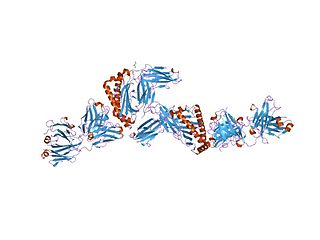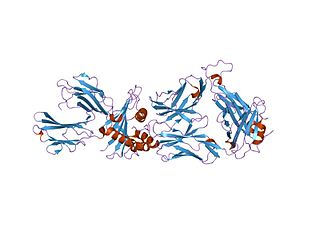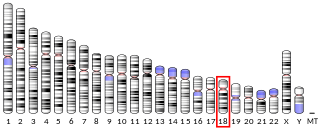
Melanoma-associated antigen 1 is a protein that in humans is encoded by the MAGEA1 gene.

Cancer/testis antigen 1 also known as LAGE2 or LAGE2B is a protein that in humans is encoded by the CTAG1B gene. It is most often referenced by its alias NY-ESO-1.

Nuclear autoantigenic sperm protein is a protein that in humans is encoded by the NASP gene. Multiple isoforms are encoded by transcript variants of this gene.

Melanoma-associated antigen 3 (MAGE-A3) is a protein that in humans is encoded by the MAGEA3 gene.

Melanoma-associated antigen 4 is a protein that in humans is encoded by the MAGEA4 gene.

Glyceraldehyde-3-phosphate dehydrogenase, spermatogenic or glyceraldehyde-3-phosphate dehydrogenase, testis-specific is an enzyme that in humans is encoded by the GAPDHS gene.

Four and a half LIM domains protein 5 is a protein that in humans is encoded by the FHL5 gene.

Melanoma-associated antigen 2 is a protein that in humans is encoded by the MAGEA2 gene.

Cystatin-8 is a protein that in humans is encoded by the CST8 gene.

Melanoma-associated antigen C2 is a protein that in humans is encoded by the MAGEC2 gene.

Melanoma-associated antigen B2 is a protein that in humans is encoded by the MAGEB2 gene.

Sperm acrosome membrane-associated protein 3 is a protein that in humans is encoded by the SPACA3 gene. It may be involved in adhesion to the egg before the egg is fertilized.

Calcium-binding tyrosine phosphorylation-regulated protein is a protein that in humans is encoded by the CABYR gene.

Sperm protein associated with the nucleus on the X chromosome A is a protein that in humans is encoded by the SPANXA1 gene.

Kinesin heavy chain isoform 5C is a protein that in humans is encoded by the KIF5C gene.

Melanoma-associated antigen 12 is a protein that in humans is encoded by the MAGEA12 gene.

Cysteine-rich secretory protein 2 is a cysteine-rich secretory protein that in humans is encoded by the CRISP2 gene.

Melanoma-associated antigen 9 is a protein that in humans is encoded by the MAGEA9 gene.
OLIGO Primer Analysis Software was the first publicly available software for DNA primer design. The first papers describing this software were published in 1989 and 1990, and consecutive upgrades in the 1990s and 2000s, all have been cited together over 600 times in scientific journals and over 500 times in patents. The program is a comprehensive real time PCR primer and probe search and analysis tool, and also does other tasks such as siRNA and molecular beacon searches, open reading frame and restriction enzyme analysis etc. It has been created and maintained by Wojciech Rychlik and Piotr Rychlik. The OLIGO has been reviewed several times in scientific journals, for the first time in 1991 in a review in Critical Reviews in Biochemistry and Molecular Biology, and for its next upgrades.

CatSper1, is a protein which in humans is encoded by the CATSPER1 gene. CatSper1 is a member of the cation channels of sperm family of protein. The four proteins in this family together form a Ca2+-permeant ion channel specific essential for the correct function of sperm cells.














